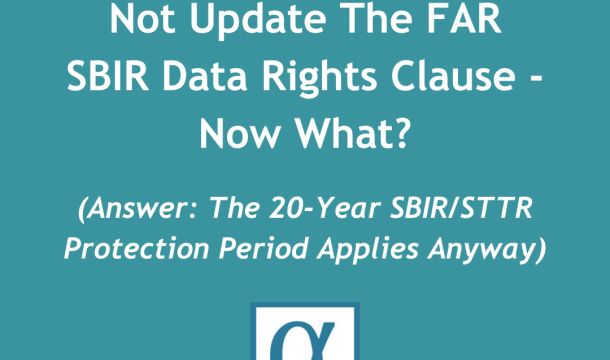The GovCon Bulletin™
Commercial Solutions Opening (CSO) - Four Things Government Contractors Should Know About DoD's Streamlined Acquisition Process
Last month, on January 31, 2023, the Department of Defense (DoD) issued a Proposed Rule that takes a further step in making the Commercial Solutions Opening a permanent contracting option for DoD agencies. A Commercial Solutions Opening (CSO) is a streamlined acquisition process that enables DoD agencies to quickly acquire “innovative” commercial products, technologies and services through fixed-price contracts (including fixed-price incentive contracts). DoD anticipates that the simplified solicitation, evaluation, and award procedures will encourage small businesses to contract with DoD.
A lack of familiarity with CSO’s, therefore, might cause contractors that have never heard of them to ignore or pass on CSO opportunities. So below are four things government contractors should know about CSO’s.
Thing One - CSO’s Are Already Being Utilized By DoD
The first thing government contractors should know is that CSO’s are already being utilized by DoD. The Proposed Rule simply codifies in DFARS existing procedures that DoD agencies currently use when they issue and contract under CSO’s. Contractors, therefore, should not wait until the Proposed Rule becomes final to familiarize themselves with CSO’s or they risk missing opportunities under CSO’s that may continue to be issued by DoD while the DFARS regulations are being finalized.
The streamlined CSO procedures were first implemented under a DoD pilot program that was authorized by the National Defense Authorization Act for Fiscal Year 2017 (NDAA 2017). NDAA 2017 had a sunset provision that ended the DoD pilot program on September 30, 2022, but National Defense Authorization Act for Fiscal Year 2022 (NDAA 22) extended the DoD program indefinitely by giving DoD permanent authority to use CSO’s to acquire innovative commercial products and services.
Interestingly, NDAA 2017 also gave the Department of Homeland Security (DHS) and the General Services Administration (GSA) authority for their own pilot programs to acquire innovative commercial items as well. NDAA 2017 also included a September 2022 sunset for those programs, but the James M. Inhofe National Defense Authorization Act for Fiscal Year 2023 (NDAA 2023) extended authorization for the programs until September 2027.
Thing Two - The Acquisition Process Is Intended To Be Streamlined
The second thing government contractors should know is that the CSO acquisition process is intended to be streamlined, with solicitations that are similar to broad agency announcements (BAA’s).
To be clear, the instructions by Congress to DoD in NDAA 2017 and again in NDAA 2022 were not particularly detailed. They simply said that DoD could acquire innovative commercial items, technologies, and services using a process with two requirements. The acquisition must include (1) a competitive selection of proposals in response to a general solicitation, and (2) a peer review of the proposals.
NDAA 2017 required DoD to issue guidance to implement this acquisition process. In a memorandum, first issued in the wake of NDAA 2017 and then updated after NDAA 2022 was passed, DoD provided a class deviation which supplements the NDAA procedural requirements by providing a basic framework that DoD contracting officers should use to acquire innovative commercial items, technologies or services. As with the NDAA’s that authorized them, the actual requirements under DoD’s basic framework are minimal and include the following:
- DoD contracting officers must use a general solicitation and call it a Commercial Solutions Opening.
- The CSO should be similar to a broad agency announcement and must include basic information like the agency’s area of interest, the selection criteria and method of evaluation, the dates of the proposal submission period, and instructions for proposal preparation and submissions.
- Acquisitions for research and development must also use procedures under FAR part 35 for R&D contracting.
- Once proposals are received, DoD must make its selection based on a review by scientific, technological or subject matter expert peers.
To date, DoD agencies have been flexible in how they have implemented CSO’s. Some, like the Department of Air Force, have issued SBIR/STTR solicitations as CSO’s, and often CSO’s incorporate only a handful of FAR provisions. However, that may change to some degree in the future if the Proposed Rule is finalized.
The Proposed Rule incorporates into DFARS the basic framework that DoD sets forth in its class deviation memorandum. In addition, as the preamble to the Proposed Rule explains, DoD expects all contracts awarded under CSO’s to be FAR Part 12 contracts. FAR Part 12 describes the policies and procedures that contracting officers must use to acquire commercial products and commercial services. The Proposed Rule, thus, amends DFARS Part 212 to include CSO's among the list of DoD procurements that are required to use FAR Part 12 procedures, which themselves are simplified from procedures that apply to the federal government’s acquisitions of non-commercial items.
Thing Three - Price Is Not A Primary Evaluation Factor
A third thing government contractors should know is that price should not be used by a DoD contracting officer as a primary evaluation factor. Under DoD’s class deviation memorandum, the primary evaluation factors for award selection must be (i) technical; (ii) importance to agency programs, and (iii) funds availability. The Proposed Rule shortens the list of primary evaluation factors to (i) technical and (ii) important to agency programs.
Under the DoD’s memorandum and the Proposed Rule, price should be considered to the extent appropriate but, at a minimum, to determine if price is fair and reasonable. Moreover, although DoD contracting officers are required to prepare written evaluation reports, they are instructed that proposals do not need to be evaluated against each other since they are not submitted in response to a common performance of work statement or statement of work.
In sum, a proposal submitted in response to a CSO is evaluated on its own merits with a primary focus on how closely it meets the agency’s need and technical requirements.
Thing Four - The Commercial Products, Technologies, or Services Must Be New
The fourth thing government contractors should know is that CSO’s are reserved for the acquisition of commercial products, technologies or services that are new.
Specifically, CSO’s can be used to acquire “innovative” commercial products and services. Both the DoD class deviation memorandum and the Proposed DFARS Rule define “innovative” as:
- Any technology, process, or method, including research and development, that is new as of the date of submission of a proposal; or
- Any application that is new as of the date of submission of a proposal of a technology, process, or method existing as of such date.
Comments to the Proposed Rule are due by April 3, 2023, and government contractors - particularly small businesses and technology companies - should take the opportunity to submit comments and request clarifications.
The Amadeo Law Firm anticipates providing additional information on CSO's in the near future.



